Publications
-
Articles in scientific journals
-
Books
-
Theses
See also profiles on Publons,
Orcid or
Google Scholar.
1. Articles in scientific journals
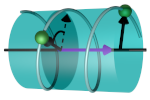 | Conformational Space of the Translocation Domain of Botulinum Toxin: Atomistic Modeling and Mesoscopic
Description of the Coiled-Coil Helix Bundle
Alexandre Delort, Grazia Cottone, Thérèse E. Malliavin, Martin Michael Müller |
Abstract
Int. J. Mol. Sci., 25: 2481, 2024.
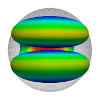 | Flexoelectric fluid membrane vesicles in spherical confinement
Niloufar Abtahi, Lila Bouzar, Nadia Saidi-Amroun, Martin Michael Müller |
EPL, 131(1): 18001, 2020. See also arXiv:2006.04475.
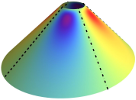 | Isometric bending requires local constraints on free edges
Jemal Guven, Martin Michael Müller, Pablo Vázquez-Montejo |
Math. Mech. Solids, 24: 4051, 2019. See also arXiv:1904.05855.
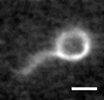 | Helical Superstructure of Intermediate Filaments
Lila Bouzar, Martin Michael Müller, René Messina, Bernd Nöding, Sarah Köster, Hervé Mohrbach, Igor M. Kulić |
Abstract
Read more
Phys. Rev. Lett., 122: 098101, 2019. See also arXiv:1803.04691.
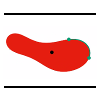 | Vesicle dynamics in confined steady and harmonically modulated Poiseuille flows
Zakaria Boujja, Chaouqi Misbah, Hamid Ez-Zahraouy, Abdelilah Benyoussef, Thomas John, Christian Wagner, Martin Michael Müller |
Abstract
Phys. Rev. E, 98: 043111, 2018. See also arXiv:1810.04500.
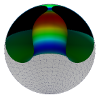 | Confining a fluid membrane vesicle of toroidal topology in an adhesive hard sphere
Lila Bouzar, Ferhat Menas, Martin Michael Müller |
Abstract
Read more
IOP Conf. Series: MSE, 186: 012021, 2017.
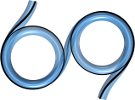 | Squeezed helical elastica
Lila Bouzar, Martin Michael Müller, Pierre Gosselin, Igor M. Kulić, Hervé Mohrbach |
We theoretically study the conformations of a helical semi-flexible filament
confined to a two-dimensional surface. This squeezed helix exhibits a variety of unexpected shapes
resembling circles, waves or spirals depending on the material parameters. We explore the conformation
space in detail and show that the shapes can be understood as the mutual elastic interaction of
conformational quasi-particles. Our theoretical results are potentially useful to
determine the material parameters of such helical filaments in an experimental setting.
 Reduce
Read more Reduce
Read more
Eur. Phys. J. E, 39: 114, 2016. See also arXiv:1606.03611.
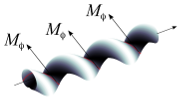 | How bio-filaments twist membranes
Julien Fierling, Albert Johner, Igor M. Kulić, Hervé Mohrbach, Martin Michael Müller |
Abstract
Soft Matter, 12: 5747, 2016.
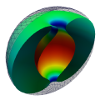 | Toroidal membrane vesicles in spherical confinement
Lila Bouzar, Ferhat Menas, Martin Michael Müller |
Abstract
Read more
Phys. Rev. E, 92: 032721, 2015. See also arXiv:1509.00765.
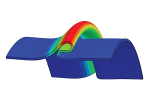 | Non-linear buckling and symmetry breaking of a soft elastic sheet sliding on a cylindrical substrate
Norbert Stoop, Martin Michael Müller |
We consider the axial compression of a thin sheet wrapped around a rigid cylindrical substrate. In contrast to the wrinkling-to-fold transitions exhibited in similar systems, we find that the sheet always buckles into a single symmetric fold, while periodic solutions are unstable. Upon further compression, the solution breaks symmetry and stabilizes into a recumbent fold. Using linear analysis and numerics, we theoretically predict the buckling force and energy as a function of the compressive displacement. We compare our theory to experiments employing cylindrical neoprene sheets and find remarkably good agreement.
 Reduce
Read more Reduce
Read more
Int. J. Non-Linear Mech., 75: 115, 2015. See also arXiv:1503.05030.
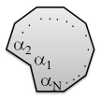 | Crunching Biofilament Rings
Julien Fierling, Martin Michael Müller, Hervé Mohrbach, Albert Johner, Igor M. Kulić |
Abstract
Read more
Europhys. Lett., 107(6): 68002, 2014. See also arXiv:1408.6787.
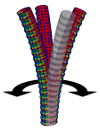 | Confotronic dynamics of tubular filaments
Osman Kahraman, Hervé Mohrbach, Martin Michael Müller, Igor M. Kulić |
Abstract
Read more
Soft Matter, 10(16): pp. 2836-2847, 2014. See also arXiv:1312.3106.
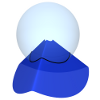 | Whirling skirts and rotating cones
Jemal Guven, J. A. Hanna, Martin Michael Müller |
Abstract
New J. Phys., 15: 113055, 2013. See also arXiv:1306.2619.
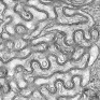 | Myotubularin and PtdIns3P remodel the sarcoplasmic reticulum in muscle in vivo
Leonela Amoasii, Karim Hnia, Gaëtan Chicanne, Andreas Brech, Belinda Simone Cowling, Martin Michael Müller, Yannick Schwab, Pascale Koebel, Arnaud Ferry, Bernard Payrastre, Jocelyn Laporte |
Abstract
J. Cell Sci., 126(8): 1806, 2013.
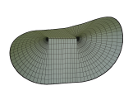 | Dipoles in thin sheets
Jemal Guven, J. A. Hanna, Osman Kahraman, Martin Michael Müller |
A flat elastic sheet may contain pointlike conical singularities that carry a metrical "charge" of Gaussian curvature. Adding such elementary defects to a sheet allows one to make many shapes, in a manner broadly
analogous to the familiar multipole construction in electrostatics. However, here the underlying field theory is non-linear,
and superposition of intrinsic defects is non-trivial as it must respect the immersion of the resulting surface in three
dimensions. We consider a "charge-neutral" dipole composed of two conical singularities of opposite sign.
Unlike the relatively simple electrostatic case, here there are two distinct stable minima and an infinity of unstable equilibria.
We determine the shapes of the minima and evaluate their energies in the thin-sheet regime where bending dominates
over stretching. Our predictions are in surprisingly good agreement with experiments on paper sheets.
 Reduce
Read more Reduce
Read more
Eur. Phys. J. E, 36: 106, 2013. See also arXiv:1212.3262.
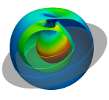 | Fluid membrane vesicles in confinement
Osman Kahraman, Norbert Stoop, Martin Michael Müller |
Abstract
Read more
New J. Phys., 14: 095021, 2012.
 | Petal shapes of sympetaleous flowers: the interplay between growth, geometry and elasticity
Martine Ben Amar, Martin Michael Müller, Miguel Trejo |
Abstract
Read more
New J. Phys., 14: 085014, 2012. Also featured in the Highlights of 2012.
 | Morphogenesis of membrane invaginations in spherical confinement
Osman Kahraman, Norbert Stoop, Martin Michael Müller |
Abstract
Read more
Europhys. Lett., 97(6): 68008, 2012. See also arXiv:1201.2518.
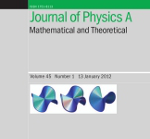 | Conical instabilities on paper
Jemal Guven, Martin Michael Müller, Pablo Vázquez-Montejo |
Abstract
Read more
J. Phys. A: Math. Theor., 45(1): 015203, 2012. See also arXiv:1107.5008.
 | Interface-mediated interactions: Entropic forces of curved membranes
Pierre Gosselin, Hervé Mohrbach, Martin Michael Müller |
Abstract
Read more
Phys. Rev. E, 83(5): 051921, 2011. See also arXiv:1011.1221.
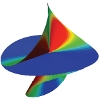 | Self-Contact and Instabilities in the Anisotropic Growth of Elastic Membranes
Norbert Stoop, Falk K. Wittel, Martine Ben Amar, Martin Michael Müller, Hans J. Herrmann |
We investigate the morphology of thin discs and rings growing in circumferential direction. Recent analytical results suggest that this growth produces symmetric excess cones (e-cones). We study the stability of such solutions considering self-contact and bending stress. We show that, contrary to what was assumed in previous analytical solutions, beyond a critical growth factor, no symmetric e-cone solution is energetically minimal any more. Instead, we obtain skewed e-cone solutions having lower energy, characterized by a skewness angle and repetitive spiral winding with increasing growth. These results are generalized to discs with varying thickness and rings with holes of different radii.
 Reduce
Read more Reduce
Read more
Phys. Rev. Lett., 105(6): 068101, 2010. See also arXiv:1007.1871.
 | Cell Model Approach to Membrane Mediated Protein Interactions
Martin Michael Müller, Markus Deserno |
Abstract
Read more
Prog. Theor. Phys. Suppl., 184: pp. 351-363, 2010.
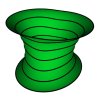 | Hamiltonian formulation of surfaces with constant Gaussian curvature
Miguel Trejo, Martine Ben Amar, Martin Michael Müller |
Abstract
Read more
J. Phys. A: Math. Theor., 42(42): 425204, 2009.
 | Local Membrane Mechanics of Pore-Spanning Bilayers
Ingo Mey, Milena Stephan, Eva K. Schmitt, Martin Michael Müller, Martine Ben Amar, Claudia Steinem, Andreas Janshoff |
The mechanical behavior of lipid bilayers spanning the pores of highly ordered porous silicon substrates was studied by local indentation experiments as a function of surface functionalization, lipid composition, solvent content, indentation velocity, and pore radius. Solvent-containing nanoblack lipid membranes (nano-BLMs) as well as solvent-free pore-spanning bilayers were imaged by fluorescence and atomic force microscopy prior to force curve acquisition, which allows distinguishing between membrane-covered and uncovered pores. Force indentation curves on pore-spanning bilayers attached to functionalized hydrophobic porous silicon substrates reveal a predominately linear response that is mainly attributed to prestress in the membranes. This is in agreement with the observation that indentation leads to membrane lysis well below 5% area dilatation. However, membrane bending and lateral tension dominates over
prestress and stretching if solvent-free supported membranes obtained from spreading giant liposomes on hydrophilic porous silicon are indented.
 Reduce
Read more Reduce
Read more
J. Am. Chem. Soc., 131(20): pp. 7031-7039, 2009.
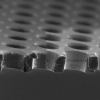 | Elasticity Mapping of Pore-Suspending Native Cell Membranes
Bärbel Lorenz, Ingo Mey, Siegfried Steltenkamp, Tamir Fine, Christina Rommel, Martin Michael Müller, Alexander Maiwald, Joachim Wegener, Claudia Steinem, Andreas Janshoff |
Abstract
Read more
Small, 5(7): pp. 832-838, 2009.
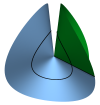 | Conical Defects in Growing Sheets
Martin Michael Müller, Martine Ben Amar, Jemal Guven |
A growing or shrinking disc will adopt a conical shape, its intrinsic geometry characterized by a surplus angle φe at the apex. If growth is slow, the cone will find its equilibrium. Whereas this is trivial if φe≤0, the disc can fold into one of a discrete infinite number of states if φe is positive. We construct these states in the regime where bending dominates, determine their energies and how stress is distributed in them. For each state a critical value of φe is identified beyond which the cone touches itself. Before this occurs, all states are stable; the ground state has twofold symmetry.
 Reduce
Read more Reduce
Read more
Phys. Rev. Lett., 101(15): 156104, 2008. See also arXiv:0807.1814.
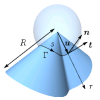 | How paper folds: bending with local constraints
Jemal Guven, Martin Michael Müller |
A variational framework is introduced to describe how a surface bends when it is subject to local constraints on its geometry. This framework is applied to describe the patterns of a folded sheet of paper. The unstretchability of paper implies a constraint on the surface metric; bending is penalized by an energy quadratic in mean curvature. The local Lagrange multipliers enforcing the constraint are identified with a conserved tangential stress that couples to the extrinsic curvature of the sheet. The framework is illustrated by examining the deformation of a flat sheet into a generalized cone.
 Reduce
Read more Reduce
Read more
J. Phys. A: Math. Theor., 41(5): 055203, 2008. See also arXiv:0712.0978.
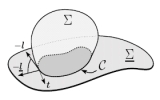 | Contact lines for fluid surface adhesion
Markus Deserno, Martin Michael Müller, Jemal Guven |
Abstract
Read more
Phys. Rev. E, 76(1): 011605, 2007. See also cond-mat/0703019.
Also featured in the Virtual Journal of Biological Physics Research.
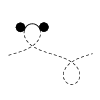 | Balancing torques in membrane-mediated interactions: Exact results and
numerical illustrations
Martin Michael Müller, Markus Deserno, Jemal Guven |
Abstract
Read more
Phys. Rev. E, 76(1): 011921, 2007. See also cond-mat/0702340.
Also featured in the Virtual Journal of Biological Physics Research.
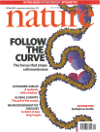 | Aggregation and vesiculation of membrane proteins by curvature-mediated
interactions
Benedict J. Reynwar, Gregoria Illya, Vagelis A. Harmandaris, Martin Michael Müller, Kurt Kremer, Markus Deserno |
Abstract
Read more
Nature 447(7143): pp. 461-464, 2007.
 | How to determine local elastic properties of lipid bilayer membranes
from atomic-force-microscope measurements: A theoretical analysis
Davood Norouzi, Martin Michael Müller, Markus Deserno |
Measurements with an atomic force microscope (AFM) offer a direct way to
probe elastic properties of lipid bilayer membranes locally: provided
the underlying stress-strain relation is known, material parameters such as
surface tension or bending rigidity may be deduced.
In a recent experiment a pore-spanning membrane was poked with an AFM tip,
yielding a linear behavior of the force-indentation curves. A theoretical
model for this case is presented here which describes these curves in the
framework of Helfrich theory. The linear behavior of the measurements is
reproduced if one neglects the influence of adhesion between tip and membrane.
Including it via an adhesion balance changes the situation significantly:
force-distance curves cease to be linear, hysteresis and nonzero detachment
forces can show up. The characteristics of this rich scenario are discussed
in detail in this article.
 Reduce
Read more Reduce
Read more
Phys. Rev. E, 74(6): 061914, 2006. See also cond-mat/0602662.
Also featured in the Virtual Journal of Biological Physics Research.
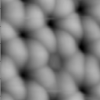 | Mechanical Properties of Pore-Spanning Lipid Bilayers Probed by Atomic Force Microscopy
Siegfried Steltenkamp, Martin Michael Müller, Markus Deserno, Christian Hennesthal, Claudia Steinem, Andreas Janshoff |
Abstract
Read more
Biophys. J., 91(1): pp. 217-226, 2006.
 | Interface mediated interactions between particles -- a geometrical approach
Martin Michael Müller, Markus Deserno, Jemal Guven |
Abstract
Read more
Phys. Rev. E, 72(6): 061407, 2005. See also cond-mat/0506019.
Also featured in the Virtual Journal of Biological Physics Research.
 | Geometry of surface-mediated interactions
Martin Michael Müller, Markus Deserno, Jemal Guven |
Abstract
Read more
Europhys. Lett., 69(3): pp. 482-488, 2005. See also cond-mat/0409043.
2. Books
-
New Trends in the Physics and Mechanics of Biological Systems
Lecture Notes of the Les Houches Summer School, vol. 92 (Oxford University Press, 2011),
edited by Martine Ben Amar, Alain Goriely, Martin Michael Müller and Leticia Cugliandolo.
Chapter 9:
The physics of the cell membrane
Martin Michael Müller and Martine Ben Amar.
3. Theses
-
Theoretical examinations of interface mediated interactions between colloidal particles,
diploma thesis (2004).
-
Theoretical studies of fluid membrane mechanics, dissertation (2007).
-
Symmetry breaking in bioelasticity, habilitation thesis (2015).
|


